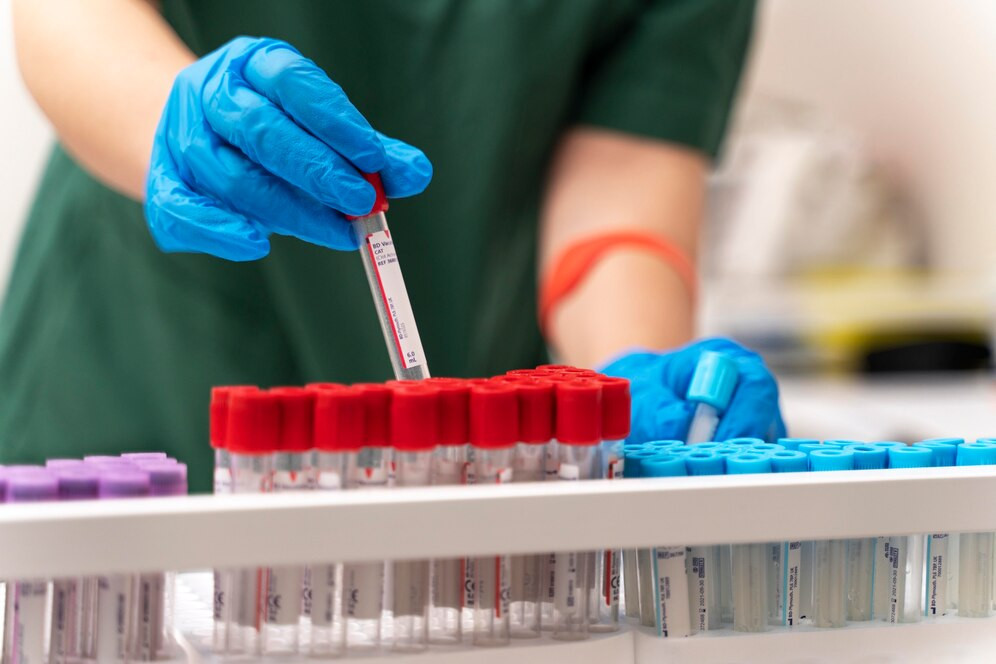Definition
The concentration of serum lipoprotein (a) is measured by Lp (a) or lipoprotein (a) test. Lipoproteins are macromolecules composed of proteins and lipids that facilitate the transportation of cholesterol in bloodstreams to various cells in the body. LDL (low-density lipoprotein) and HDL (high-density lipoprotein) stand for "bad" and "good" cholesterol, respectively, as the two primary categories of lipoproteins.
Lipoprotein (a) is a type of LDL. Elevated amounts of LDL can lead to the accumulation of cholesterol plaques that block the arteries. This process is referred to as atherosclerosis, it could thicken and harden the arteries. This has the potential to result in serious cardiovascular diseases, such as coronary artery disease, heart attack, or stroke.
This blood test can help in providing a more accurate assessment of your cardiovascular risk. An increased level of lipoprotein (a) is a separate indicator of coronary artery disease, heart attack, stroke and abnormal blood clotting. Contrary to cholesterol levels, which are often associated with lifestyle and dietary habits, lipoprotein (a) levels are mostly influenced by genetic factors that can be inherited from their family. Lipoprotein (a) levels could vary significantly among people from various ethnic groups.
We also have an article on LDL which you can read here: LDL - Definition, Indication and Contraindication.
Indications
This test is performed to determine whether your lipoprotein (a) levels are normal or elevated. Elevated levels of lipoprotein (a) is associated with an increased risk of cardiovascular diseases that have been mentioned above.
Lipoprotein (a) test is primarily utilized for screening and detecting cardiovascular diseases at an early stage, prior to the manifestation of any signs or symptoms. It is typically advised for individuals who are suspected to be at risk of developing cardiovascular disease in the future. Lipoprotein (a) test is not advised to be carried out as a screening measure in the general population that do not have any cardiovascular risk factors.
A lipoprotein (a) test can also provide guidance for treatment decisions in reducing cholesterol levels and mitigating the risk of cardiovascular disease. For instance, a physician may take into account lipoprotein (a) levels when determining whether the patients could be prescribed cholesterol-lowering drugs. Furthermore, this test could also be advised if their LDL cholesterol levels do not reduce to the expected target when undergoing treatment with cholesterol medications.
Contraindication
There are no individuals for whom it is advised against to check their serum lipoprotein (a) level; everyone is eligible to undergo blood tests for monitoring the levels of lipoprotein (a) in their bodies.
Preparations Prior to Test
Prior to Lipoprotein (a) test, it is necessary to fast for twelve hours the night before. Accordingly, you will be prohibited from consuming any food or beverages, with the exception of water, prior to the test. Smokers will be required to abstain from smoking for twelve hours prior to the test.
Individuals who have experienced a recent infection accompanied by fever may be required to wait for a few days before undergoing the test. Consult your physician regarding your recent medical history in order to decide on the most suitable time to undergo the test.
Certain medications also have the potential to affect the test's outcome. It is advisable to inform your physician about your medication usage, including niacin supplements or hormone medication (estrogens). Whether or not you need to stop taking any of these medications for the test depends on your physician's instructions.
Test Procedures
A healthcare professional will extract a blood sample from a vein, usually in your arm, using a tiny needle. Once the needle is placed, a little sample of blood will be drawn into a test tube. You may experience a slight stinging sensation when the needle is inserted or removed.
Normal and Abnormal Values
Serum lipoprotein (a) levels can be reported in either milligrams per deciliter (mg/dL) or nanomoles per liter (nmol/L), depending on the method employed in the laboratory.
The reference range for this test is under 30 milligrams per deciliter (mg/dL). Sometimes the concentration of serum lipoprotein (a) cannot be detected because the amount is so low. Healthcare practitioners regard low or undetectable levels of Lipoprotein (a) as indicative of good health. However, if your lipoprotein (a) levels exceed the threshold of 30 mg/dL, it could suggest an elevated risk of developing atherosclerosis, experiencing cardiovascular disease such as heart attack or stroke.
Results and Suggestions (Follow-Up Tests)
Elevated concentration of serum lipoprotein (a) are regarded as a possible factor in the development of cardiovascular diseases. Typically, lipoprotein (a) levels exceeding 50 mg/dL or 125 nmol/L are posing a significant risk for cardiovascular diseases.
As explained previously, since the levels of lipoprotein (a) are determined primarily by genetics, this means it could not be changed by modifying your diet, lifestyle habits or medications. Because genetics play a significant role, the concentrations are unlikely to go through any changes in their lives.
Because of that, if it is found out that your lipoprotein (a) levels are elevated, It is crucial to start taking actions in improving your cardiovascular health. Hopefully it will help decrease your overall cardiovascular risk, even though your lipoprotein (a) levels may not change much.
The following might be recommended by your physicians if your test results are high:
- Take cholesterol lowering medicines to help reduce elevated LDL cholesterol levels
- Maintain a nutritious diet
- Weight loss
- Quit smoking
- Making it a habit to exercise routinely
- Try to reduce your stress level
- Lower your blood pressure
Consult to The Right Doctor
Lipoprotein (a) test is not a standard cholesterol test and not performed routinely. It is often conducted only if you have already been identified to be more at risk to develop cardiovascular diseases in the future. Experts are now investigating the impact of lipoprotein (a) levels on people's health. There is currently no general agreement among experts regarding the optimal timing for conducting this test. Various organizations provide specific guidelines related to this test.
For the best explanation of your test results, consult your physician or internist. Interpreting a lipoprotein (a) test result requires considering many factors including your age, results from other cholesterol tests, additional risk factors for cardiovascular disease, and your overall health.
Want to know more information about laboratory, radiology and other examination results? Click here!
- dr Hanifa Rahma
What is a Lipoprotein (a) Test?. (2021). Retrieved 11 July 2023, from https://medlineplus.gov/lab-tests/lipoprotein-a-blood-test/
Lipoprotein (a) Test. (2022). Retrieved 11 July 2023, from https://www.testing.com/tests/lipoprotein-a/
Lipoprotein-A Test. (2017). Retrieved 11 July 2023, from https://www.healthline.com/health/lipoprotein-a
What to Know about Lipoprotein (a). Retrieved 11 July 2023, from https://www.medicalnewstoday.com/articles/lipoprotein-a-what-it-is-test-results-and-what-they-mean
Lipoprotein - a. (2023). Retrieved 11 July 2023, from https://www.mountsinai.org/health-library/tests/lipoprotein-a
Lipoprotein (a) Cholesterol. (2023). Retrieved 11 July 2023, from https://www.urmc.rochester.edu/encyclopedia/content.aspx?contenttypeid=167&contentid=lpa_cholesterol












